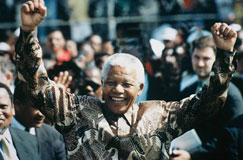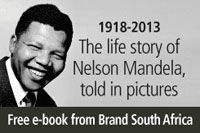UN gives thanks for Madiba's 'inheritance of hope'
20 December 2012
A special meeting of the United Nations General Assembly (UNGA) was convened in
New York on Friday, to give Member States an opportunity to pay tribute to former
president Nelson Mandela, who passed away on 5 December in South Africa aged 95.
More than 50 speakers recalled the late statesman’s journey from prisoner to
president to Nobel Peace prize winner.
Passionate revolutionary, apostle of peace, champion of human rights, nation builder
and beacon of freedom were among the terms of endearment bestowed on former
South African President Nelson Mandela during the meeting.
Touching upon his life's numerous milestones, delegates chronicled the 27 years he
spent in prison for challenging an apartheid government, his emergence into freedom
in 1990, his Nobel Peace Prize, his leadership in halting racial segregation and his rise
to become the first democratically elected president of South Africa.
Secretary-General Ban Ki-moon, describing the services held for Mandela in South
Africa last week, which had occurred under heavy rain, told delegates that the
weather was almost a reminder that without rain there could be no rainbow. It was
now the world’s duty to follow his lead and to follow his rainbow for the global good.
The UN chief said Mandela showed that tyranny and oppression never have the last
word.
"That is the heritage of hope he bestowed on each and every one of us. That is our
inheritance.
"Now it is our duty to build the better world that he showed is within our grasp. Today
and every day, let us be inspired by his passion, his compassion, and his undying
conviction in the human spirit and the global good."
Lasting peace
The world must also follow in his footsteps, General Assembly President John
Ashesaid (Antigua and Barbuda) said. "Let us remember that we too must work
together to reduce hunger
and injustice to build lasting peace and sustainable
development, to stop genocide and hunger."
Kingsley Mamabolo, the Permanent Representative of South Africa, thanked all
speakers for their kindness in paying tribute to his country’s great hero. Archbishop
Desmond Tutu in a video message offered appreciation for the tribute and to Madiba
for his enormous contributions to all of humanity.
Some delegates shared personal moments they had had with Mandela. David Dinkins,
New York City’s first African-American Mayor, remembering Mandela’s visit to Gracie
Mansion, described a man who was consistent, whether playing with Dinkins’
granddaughter or facing the media.
Historic memories
Historic memories were also shared. Some delegates proudly recalled their countries’
leaders hosting visits by Mandela after his release from prison. Among them, India’s
speaker recalled that during his visit, Mandela had received the Bharat Ratna, his
country’s highest civilian honour.
More broadly, some speakers spoke of how Mandela had deeply inspired their
communities, nations and regions. Representatives of Timor-Leste and of Rwanda told
the Assembly how his ideals had guided their respective countries forward on the path
of reconciliation.
Some delegates, including Sri Lanka’s, recalled their countries’ boycott of South
Africa’s apartheid regime. Others reported days of national mourning observed by
their citizens after the former President’s death.
Nigeria’s speaker called him an icon while Mozambique’s representative called him a
symbol of leadership and courage. A United States delegate called him a giant on the
world stage. Brazil’s speaker said he was the greatest statesman of the 20 century.
'The apartheid within'
"Let us join him in his humanity and try to rid ourselves from the apartheid within
ourselves," proclaimed Syria’s speaker, on behalf of the
Group of Asia-Pacific States,
receiving, in response, a spontaneous round of applause.
The Permanent Observer for the State of Palestine said Mandela would forever be an
icon of freedom and the most vivid example in modern times of the power of
forgiveness and reconciliation after brutal oppression. "President Mandela remains an
embodiment of the conscience of the world," he said.
While remembering Mandela’s triumphs, many speakers underlined the obligation all
people should have in order to carry on his ideals and vision in trying to build a better
and more just world.
Fiji’s speaker, on behalf of the "Group of 77" developing countries and China, said the
United Nations should do everything possible to pursue the goals that Mandela had
struggled so long and hard to achieve. "Whatever our handicaps, we should aspire to
reach the higher ground to which he pointed us," he said.
'Get back to work'
Pointing out that the
world would be gathering next year to shape a post-2015
development agenda, he underscored Madiba’s exhortation that overcoming poverty
was not a task of charity, but one of justice.
While that task could seem enormous, he cited Madiba, who once said, "It always
seems impossible, until it’s done."
While Mandela was exceptional, he was also modest, said Switzerland’s
representative. Guessing at his reaction to the words just heard during the special
meeting, he said Mandela probably would have said, "I am very touched by your
words. Please leave the room now and get to work."
SAinfo reporter and United Nations
 Former President Nelson Mandela (Photo: SANews)
Former President Nelson Mandela (Photo: SANews)




